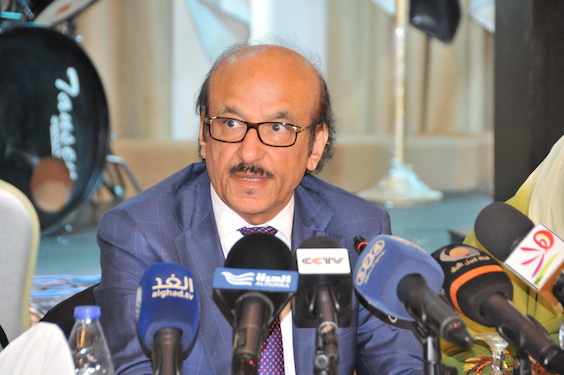 Dr. Mahmoud Fikri, Regional Director of WHO, addresses the audience attending the Sudanese launch of CARMMA (Photo: Lina Mustapha/WHO Sudan)
Dr. Mahmoud Fikri, Regional Director of WHO, addresses the audience attending the Sudanese launch of CARMMA (Photo: Lina Mustapha/WHO Sudan)
August 2, 2017 - Maternal health was the focus of three days of high-level events in Khartoum, including participation from Sudan’s Prime Minister General Bakri Hassan Salih and the World Health Organization’s (WHO) Regional Director for the Eastern Mediterranean, Dr. Mahmoud Fikri.
On July 31 and August 1, the African Union Commission with WHO and partners launched Sudan’s participation in the Campaign to Advance the Reduction of Maternal Mortality in Africa (CARMMA), making Sudan the third North African country to do so after Tunisia and Somalia.
CARMMA is a major initiative of the African Union Commission (AUC), aimed at promoting and advocating for renewed and intensified implementation of the Maputo Plan of Action to improve Maternal, Newborn and Child Health in the Africa Region. The main objective of the campaign is to accelerate the availability and use of universally accessible quality health services, including those related to sexual and reproductive health, that are critical to the reduction of maternal and child mortality.
Dr. Fikri of WHO highlighted the important progress Sudan has made in advancing maternal and child health, “targeting the survival and the thriving of mothers and children through effective policies and programmes”. In Sudan, maternal mortality has decreased from 544 per 100,000 in 2000 to 311 per 100,000 in 2010 as per figures from the UN’s Maternal Mortality Estimation Inter-Agency Group. Similarly, according to the Multiple Indicator Cluster Survey (MICS 2014), under Five Mortality has decreased over the last two decades from 104 deaths per thousand live births in 1996, to 68 deaths per thousand live births in 2014. The percentage of pregnant assisted by skilled birth attendants during delivery grew to 77.7% from 72.5% during the same period.
Following the launch of CARMMA, on August 1 Sudan marked another important milestone in maternal health on the first annual celebration of the National Day of Mother and Child Health. At the occasion, which was attended by dignitaries from government, civil society, and the UN, Sudan’s Prime Minister General Bakri Hassan Saleh affirmed the country’s keenness on improving the health situation and reducing maternal mortality.
Dr. Fikri of WHO emphasized the commitment of the organization to improving the health of women, newborns, children and adolescents in Sudan and the other countries in the region, and appreciated the commitment of Sudan’s government to these issues. "Together, we emphasize counting every single maternal and child death by adopting efficient maternal and perinatal death surveillance systems and health responses,” he said.
In addition to CARMMA, Sudan has launched numerous other initiatives promoting maternal health including the “10 by 5” Reproduction, Maternal, Newborn, Child and Adolescent Health (RMNCAH) Strategy in September 2016, which presents a bold yet realistic vision whereby Sudan will move solidly towards the targets that it has set for itself, Presidential decrees on the “Primary health care Expansion Project”, the “Free Under-five Drugs Scheme”, and later followed by an “Antenatal Care Scale-up Program” and lastly the “Maternal Mortality Reduction Initiative”, and joined the Scaling up Nutrition (SUN) movement.


